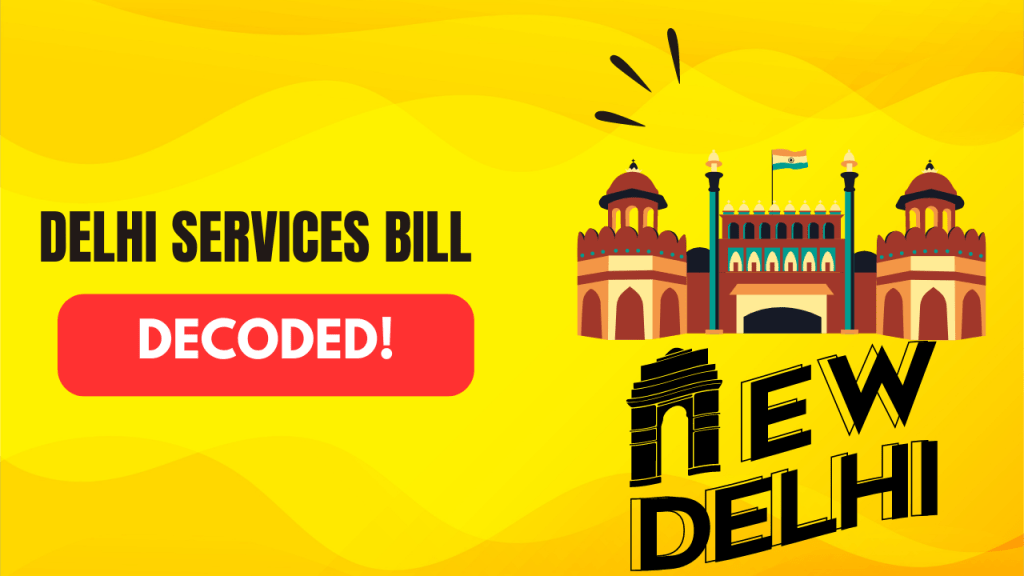The Delhi Services Bill is a hot topic that has sparked a lot of debate and controversy in the country. The bill, which was passed by the Parliament in August 2023, aims to change the way Delhi is governed and administered. The bill gives more powers to the Lieutenant Governor (L-G) of Delhi, who is appointed by the President of India, and limits the role of the elected Delhi Assembly and the Chief Minister.

But what does this bill mean for you, as a citizen of Delhi or India? How will it affect your life and rights in the national capital? What are the pros and cons of this bill? And what are some of the common questions and doubts that you might have about it?
In this blog post, we will provide you with the ultimate guide to understanding the Delhi Services Bill and its implications. We will explain the background, the provisions, and the impact of this bill in a simple and easy way. We will also address some of the frequently asked questions (FAQs) that you might have about this bill.
So, let’s get started! 🚀
What is the Delhi Services Bill? 🤔
The Delhi Services Bill, formally known as the Government of National Capital Territory of Delhi (Amendment) Bill, 2023, is a bill that seeks to amend an existing law called the Government of National Capital Territory of Delhi Act, 1991. This law defines the roles and responsibilities of the L-G and the Delhi government in accordance with the Constitution of India.
The Constitution grants special status to Delhi as a Union Territory with a legislative assembly and a council of ministers. This means that Delhi is not a full-fledged state like Uttar Pradesh or Maharashtra, but it has some degree of autonomy and self-governance. The Constitution also specifies that some matters, such as public order, police and land, are under the exclusive control of the Centre, while other matters, such as health, education and transport, are under the shared control of both the Centre and the state.
However, there have been many conflicts and disputes between the L-G and the Delhi government over their respective powers and jurisdictions. The AAP government, led by Chief Minister Arvind Kejriwal, has accused the L-G of interfering in its functioning and stalling its decisions on various matters. The L-G, on his part, has claimed that he is bound by his constitutional duty to act as per his own discretion and refer matters to the Centre when required.
To resolve these disputes, several petitions were filed in various courts, seeking clarity on the Constitution and the law governing Delhi. The Supreme Court delivered two landmark judgments on this issue: one in 2018 and another in 2020.
In 2018, a five-judge constitution bench of the Supreme Court ruled that:
- The L-G is not an independent authority but an administrative head bound by the aid and advice of his council of ministers.
- The L-G does not have any independent decision-making power and cannot act as an obstructionist.
- The L-G can refer only those matters to the President which involve a difference of opinion with his council of ministers and are exceptional in nature.
- The L-G must work harmoniously with his council of ministers and respect their collective responsibility.
- The legislative assembly has the power to make laws on all matters except public order, police and land, subject to Parliament’s overriding power.
In 2020, a three-judge bench of the Supreme Court ruled that:
- The L-G has no power over services (transfers and postings of officials) in Delhi and this power vests with the council of ministers.
- The Anti-Corruption Branch (ACB) also falls under the domain of the council of ministers.
- The L-G can refer only those matters to the President which are not incidental or ancillary to matters over which the legislative assembly has power to make laws.
The Centre, however, was not satisfied with these judgments and claimed that they had created ambiguity and confusion in the governance of Delhi. The Centre argued that the L-G is not a mere figurehead but a constitutional functionary who has to ensure compliance with the laws made by Parliament and the President. The Centre also contended that the L-G has to safeguard the national interest and security in Delhi, which is the seat of the central government and a sensitive territory.
Therefore, the Centre introduced the Delhi Services Bill in May 2023 as an ordinance, which is a temporary law that can be issued by the President when Parliament is not in session. The ordinance was later replaced by the bill, which was passed by both houses of Parliament in August 2023.
The bill has four main provisions:
- It states that the term “government” in any law made by the Delhi Assembly shall mean the L-G. This means that any decision taken by the Delhi government under any law made by it will have to be approved by the L-G before it is implemented.
- It states that the L-G’s opinion shall be obtained before taking any executive action on decisions taken by the Delhi Cabinet or any individual minister, in matters where he has a difference of opinion with them.
- It states that the Delhi Assembly shall not make any rule to enable itself or its committees to consider matters of day-to-day administration or conduct inquiries in relation to administrative decisions. This means that the Delhi Assembly will not be able to scrutinize or question the actions of the L-G or his officials.
- It states that the L-G shall reserve for consideration of the President any bill passed by the Delhi Assembly if it is outside the purview of its legislative powers or if it is incidentally covered by any matter which falls outside its jurisdiction.
Why should you care about this bill? 🙋♂️
You might be wondering why you should care about this bill and how it will affect you. Well, if you are a citizen of Delhi or India, then this bill has a direct or indirect impact on your life and rights. Here are some reasons why you should care about this bill:
- It affects your right to vote and elect your representatives: The bill reduces the powers and autonomy of the Delhi government and its council of ministers, who are elected by the people of Delhi. This means that your vote and voice will have less weight and influence in the governance and administration of the national capital. You might feel that your elected representatives are unable to fulfill their promises or address your grievances because they are dependent on the approval or opinion of the L-G, who is appointed by the Centre.
- It affects your access to public services and welfare schemes: The bill gives the L-G more control over services (transfers and postings of officials) in Delhi. This means that the delivery and quality of public services and welfare schemes, such as health, education, transport, water, electricity, etc., might depend on the discretion or preference of the L-G, who might have different priorities or agendas than the Delhi government. You might face difficulties or delays in availing these services or schemes because they are subject to the approval or opinion of the L-G.
- It affects your participation in democracy and accountability: The bill limits the role and function of the Delhi Assembly and its committees, which are meant to hold the executive accountable and represent the voice of the people of Delhi. This means that you will have less opportunity or platform to express your views or opinions on various matters affecting your life or rights in Delhi. You might also feel that there is less transparency or accountability in the governance and administration of the national capital because the actions or decisions of the L-G or his officials are not subject to the scrutiny or questioning of the Delhi Assembly or its committees.
What are the pros and cons of this bill? 🤷♀️
The bill has been hailed by some as a necessary step to streamline the administration of Delhi and avoid conflicts between the Centre and the state. The bill has also been criticized by others as a blatant attempt to undermine the democratic rights of the people of Delhi and reduce their elected representatives to mere puppets.
Some of the pros of the bill are:
- It will bring clarity and certainty in the roles and responsibilities of the L-G and the Delhi government, as per the constitutional scheme of governance of Delhi.
- It will ensure that the L-G acts as a check and balance on the Delhi government and prevents any arbitrary or illegal actions by them.
- It will enable the L-G to exercise his powers and functions in consultation with the Centre, which has a larger stake and interest in the affairs of Delhi.
- It will facilitate better coordination and cooperation between the Centre and the state on matters of common concern, such as security, infrastructure, development, etc.
- It will uphold the supremacy of Parliament and the President in making laws for Delhi, which is a Union Territory and not a full-fledged state.
Some of the cons of the bill are:
- It will dilute the powers and autonomy of the Delhi government and its council of ministers, who are elected by the people of Delhi.
- It will give the L-G an overriding authority over the Delhi government and make him act as a proxy for the Centre, which may have political motives or biases.
- It will create hurdles and delays in the implementation of policies and decisions taken by the Delhi government for the welfare of the people of Delhi.
- It will curtail the role and function of the Delhi Assembly and its committees, which are meant to hold the executive accountable and represent the voice of the people of Delhi.
- It will violate the spirit and intent of Article 239AA, which grants special status to Delhi as a Union Territory with a legislative assembly and a council of ministers.
As you can see, there are both positive and negative aspects of this bill. You might agree or disagree with some or all of them. You might also have your own opinions or perspectives on this bill. Whatever your stance is, we encourage you to share it with us in the comment section below. We would love to hear from you and have a healthy and respectful discussion. 🙌
FAQs 🙋♂️
Here are some frequently asked questions (FAQs) about the Delhi Services Bill:
Q: Does the bill take away the power of the Delhi government to make laws?
A: No, the bill does not take away the power of the Delhi government to make laws on matters within its legislative competence. The bill only states that the term “government” in any law made by the Delhi Assembly shall mean the L-G. This means that any decision taken by the Delhi government under any law made by it will have to be approved by the L-G before it is implemented.
Q: Does the bill give absolute power to the L-G over services?
A: No, the bill does not give absolute power to the L-G over services. The bill only states that the L-G’s opinion shall be obtained before taking any executive action on decisions taken by the Delhi Cabinet or any individual minister, in matters where he has a difference of opinion with them. This means that if there is no difference of opinion between the L-G and the Delhi government on any matter related to services, then there is no need for obtaining his opinion.
Q: Does the bill prevent the Delhi Assembly from conducting inquiries or investigations?
A: No, the bill does not prevent the Delhi Assembly from conducting inquiries or investigations. The bill only states that the Delhi Assembly shall not make any rule to enable itself or its committees to consider matters of day-to-day administration or conduct inquiries in relation to administrative decisions. This means that if there is any matter that is not related to day-to-day administration or administrative decisions, then there is no restriction on making rules or conducting inquiries or investigations by the Delhi Assembly or its committees.
Q: Does the bill allow the L-G to reject any bill passed by the Delhi Assembly?
A: No, the bill does not allow the L-G to reject any bill passed by the Delhi Assembly. The bill only states that the L-G shall reserve for consideration of the President any bill passed by the Delhi Assembly if it is outside the purview of its legislative powers or if it is incidentally covered by any matter which falls outside its jurisdiction. This means that if there is any bill that is within the purview of the Delhi Assembly and does not touch upon any matter that is exclusively reserved for the Centre, then there is no need for reserving it for the President.
Conclusion 🎯
The Delhi Services Bill is a significant legislation that has far-reaching consequences for the governance and administration of the national capital. The bill has been welcomed by some as a step towards clarity and efficiency, and opposed by others as a move towards centralization and domination. The bill has also raised several constitutional and legal questions that may require further judicial intervention and interpretation.
The bill, however, does not change the basic structure of Article 239AA, which grants special status to Delhi as a Union Territory with a legislative assembly and a council of ministers. The bill also does not affect the rights and duties of the people of Delhi, who are entitled to participate in the democratic process and elect their representatives. The bill, therefore, should not be seen as a final or conclusive word on the matter, but rather as a part of an ongoing dialogue and debate between the Centre and the state on the optimal way of governing Delhi.
We hope that this blog post has helped you to understand the Delhi Services Bill and its implications better. If you have any comments, questions or feedback, please feel free to share them with us in the comment section below. Thank you for reading! 😊




